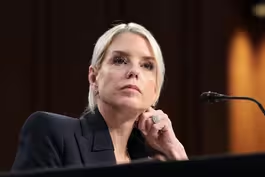
Trump considers farmer bailout as tariffs disrupt market
Clip: 10/7/2025 | 9m 34sVideo has Closed Captions
Trump considers $10 billion bailout for farmers as tariffs disrupt the market
President Trump is said to be preparing a bailout package of at least $10 billion that could provide relief to farmers facing the financial pain of tariffs on China. To discuss what this means for farmers and for the heartland, Liz Landers spoke with Aaron Lehman. He is the President of the Iowa Farmers Union, representing growers in the second-largest soybean-producing state in the country.
Problems playing video? | Closed Captioning Feedback
Problems playing video? | Closed Captioning Feedback
Major corporate funding for the PBS News Hour is provided by BDO, BNSF, Consumer Cellular, American Cruise Lines, and Raymond James. Funding for the PBS NewsHour Weekend is provided by...

Trump considers farmer bailout as tariffs disrupt market
Clip: 10/7/2025 | 9m 34sVideo has Closed Captions
President Trump is said to be preparing a bailout package of at least $10 billion that could provide relief to farmers facing the financial pain of tariffs on China. To discuss what this means for farmers and for the heartland, Liz Landers spoke with Aaron Lehman. He is the President of the Iowa Farmers Union, representing growers in the second-largest soybean-producing state in the country.
Problems playing video? | Closed Captioning Feedback
How to Watch PBS News Hour
PBS News Hour is available to stream on pbs.org and the free PBS App, available on iPhone, Apple TV, Android TV, Android smartphones, Amazon Fire TV, Amazon Fire Tablet, Roku, Samsung Smart TV, and Vizio.
Providing Support for PBS.org
Learn Moreabout PBS online sponsorshipYou're also tracking the Trump administration looking at ways to mitigate the impact of the tariffs on farmers, many of these farmers who voted for President Trump.
What more do we know about that?
LIZ LANDERS: Well, the tariffs and the trade war in particular with China have had a big impact on American farmers.
Last year, China bought more than half of the U.S.'
soybean products.
Now that has dropped down to zero.
And the president has said to be working on this bailout bill that could be $10 billion that could provide some relief to farmers that are facing these losses.
But much of that money cannot be allocated and distributed until after this shutdown is over.
"News Hour" spoke to a couple of farmers about the impact that this is already having.
CHRIS GIBBS, Ohio Farmer: I'm Chris Gibbs, a farmer in West Central Ohio.
We own and operate 560 acres of corn, soybeans and wheat.
TYLER STAFSLIEN, North Dakota Farmer: Tyler Stafslien and my farm is located, fairly close to Makoti, North Dakota.
CHRIS GIBBS: I think what folks need to realize is how much of our soybean crop gets shipped overseas and is purchased by foreign buyers.
That's about 50 percent.
Out of that portion, half of that gets sold historically to China.
And China this year has purchased zero amount of our soybeans, which is unprecedented.
TYLER STAFSLIEN: I haven't actually marketed any of my beans yet because the price is at a point where I don't want to sell anything.
So what I'm doing at this point is storing my beans, hoping for some type of economic recovery, that the price goes up.
In the meantime, yes, I mean, I'm losing money.
CHRIS GIBBS: We're just about done with our soybeans, and we're $2 a bushel under the cost of production.
That manifest as $100 loss for every acre that I harvest.
So I'm about done with our soybean harvest.
We have lost -- we're rolling right into a guaranteed loss for that crop.
TYLER STAFSLIEN: The financial stress is real.
Like, if you're a business like mine, you have to have dollars coming in order to pay the bills that inevitably come.
So the longer that it takes for Congress to approve an aid package, the more we feel it out here.
CHRIS GIBBS: Certainly, any kind of a bailout will help agriculture.
It'll help farmers.
It'll help relieve what we are currently in, which is a major cash flow and working capital crisis.
But that's not what farmers want.
Farmers, ranchers, men and women that work in agriculture, these are independent folks.
And they're not interested in bailouts.
They're interested in our markets.
TYLER STAFSLIEN: The farmers that are dependent upon soybean sales and the Main Street businesses that are dependent on farmers spending money, without a fix to this, it will be extremely devastating.
There will be many, many that will go out of business.
Again, the rural towns will suffer.
The schools will suffer.
It's a cascading effect.
Like, this doesn't just affect farmers.
It affects all of rural America.
LIZ LANDERS: For more on what this all means for farmers and for the heartland, I'm joined now by Aaron Lehman.
He is the president of the Iowa Farmers Union representing growers in the second largest soybean-producing state in the country.
Aaron, welcome to the "News Hour."
AARON LEHMAN, President, Iowa Farmers Union: It's good to be here.
LIZ LANDERS: So we just heard from farmers in North Dakota and Ohio.
What are you hearing from farmers in your state?
AARON LEHMAN: Yes, our farmers are feeling it from all sides.
So many report they're at the brink of a crisis situation.
LIZ LANDERS: And when you say a crisis, what does that look like for some of these farmers, going into debt?
Does it look like -- how will that impact the local community where you are in Iowa?
AARON LEHMAN: Yes, already, we're hearing reports of a lot of farmers having very serious conversations with their farm lenders going into next year's season with their landlords.
They're trying to find ways that they can tighten their belts, putting off machinery purchases that are long overdue, dealing with trying to figure out how to bring the next generation on the farm and putting off plans to bring the next generation on the farm.
The impacts are immediate, but the impact is also long-lasting.
And, really, we're at the place where it could really cause some serious long-term damage to our farms and to our rural communities.
LIZ LANDERS: There are reports that a Trump administration bailout of farmers -- and, apparently, it's going to be mostly these soybean producers -- that this is in the works and it could be around $10 billion to $14 billion in aid.
Do you think that's enough?
And does that address the underlying issue here?
AARON LEHMAN: Well, it certainly won't make farmers whole, right?
It will help when you're -- it is a bandage on a bad wound, but it certainly doesn't fix the problem.
It doesn't address the wound.
But it will -- we do want to help farmers who are in this situation through no fault of their own.
But there are long-term impacts that are very, very dangerous.
We also know that when aid packages were rolled out five years ago, many farmers who were in need at that time didn't receive any of the aid package.
And some of the largest multinational corporations in the world receive the largest payments.
And that doesn't make sense.
And it only causes more divisions between our farming operations.
Our small and medium-sized operations, are in need of that assistance.
And getting it to the right place so it can have the right impact on the farm and in our fields is extremely important.
LIZ LANDERS: In that vein of what you were just saying, in 2018, a similar standoff saw soybean exports plummet 77 percent.
Have farmers fully recovered from that first trade war during President Trump's first administration?
And what do farmers want to see from the administration now?
AARON LEHMAN: Yes, so many farmers didn't recover.
We know that a lot of buyers around the world five years ago started to go to farmers in other places.
And some of those buyers never came back to farmers in this country to buy soybeans again.
Trade relationships are built through good relationships, good transactions, negotiating in good faith.
Farmers invest in these trade relationships.
But they can be undone very, very quickly.
And a lot of those relationships have never been repaired.
And the long-term damage from this situation is, is that we won't see those relationships rebuilt for a long time.
So that's the real danger we're facing here long-term.
What we want to see is, we want to see a trade approach that has a plan to get to fair trade, so that trade agreements can have benefits that reach all the way down to the farm and all the way down to our farmworkers in our food system.
We also want to see a relationship that takes into account the investment that farmers have put into building these trade relationships over years.
The other thing that we need to have is, we have not had a farm bill passed in eight years.
That's five -- that's three years overdue.
Farm bills provide stability for the farming economy.
We're long overdue with that.
LIZ LANDERS: Aaron, President Trump won Iowa by 13 points in the last election.
Every rural county in the state voted for the president.
How are Iowa farmers feeling now about him when you talk to them about this issue?
And is this an issue that could turn folks against the Republican Party in the midterm elections next year?
AARON LEHMAN: Well, all farmers are different, right?
They voted for different candidates for different reasons.
What we're hearing from folks is that we really need a commonsense approach and we need our elected leaders here in Iowa and around the country to say, this is the impact in my state, in my district, and they need to speak loudly and clearly so that the administration gets the message that the current approach is not getting us any closer to where we need to be.
LIZ LANDERS: You mentioned that farmers want fairness.
President Trump says he wants fair deals for farmers and he has gone to battle to get those deals.
What do you say to that?
AARON LEHMAN: We're not getting any closer to fair trade for farmers.
Yes, we have big issues that we need to address to get to fair trade.
We need to address all those issues so that, when we pass a trade agreement, it doesn't just benefit the grain traders and those few corporations who control the grain trade.
We need to make sure those benefits can get all the way down to our farm, all the way down to our rural communities.
We need -- we do need to make reforms, but this approach isn't getting us anywhere near that.
In fact, we're moving farther away from getting the fair trade that makes a difference for farmers.
LIZ LANDERS: Aaron Lehman of the Iowa Farmers Union, thank you so much for joining "News Hour."
AARON LEHMAN: Thank you much for having me here.
Bondi dodges Democrats' questions in Senate hearing
Video has Closed Captions
Clip: 10/7/2025 | 3m 56s | Bondi dodges Democrats' questions on weaponizing DOJ in Senate hearing (3m 56s)
The complications and risks of AI chatbot relationships
Video has Closed Captions
Clip: 10/7/2025 | 7m 57s | The complications and risks of relationships with AI chatbots (7m 57s)
Israel marks 2 years since Oct. 7 Hamas attacks
Video has Closed Captions
Clip: 10/7/2025 | 8m 58s | Israel marks 2 years since Hamas attacks as peace talks offer glimmer of hope (8m 58s)
News Wrap: Texas National Guard arrives near Chicago
Video has Closed Captions
Clip: 10/7/2025 | 4m 8s | News Wrap: Texas National Guard troops arrive at training center near Chicago (4m 8s)
'Science Under Siege' warns of effort to discredit science
Video has Closed Captions
Clip: 10/7/2025 | 8m 7s | Authors of 'Science Under Siege' warn of concerted effort to discredit science (8m 7s)
Trump threatens no back pay for furloughed federal workers
Video has Closed Captions
Clip: 10/7/2025 | 3m | Trump threatens no back pay for furloughed federal workers after shutdown ends (3m)
What justices signaled in hearing on conversion therapy ban
Video has Closed Captions
Clip: 10/7/2025 | 5m 25s | What Supreme Court justices signaled in arguments over Colorado's conversion therapy ban (5m 25s)
Providing Support for PBS.org
Learn Moreabout PBS online sponsorship
- News and Public Affairs

FRONTLINE is investigative journalism that questions, explains and changes our world.

- News and Public Affairs

BREAKING the DEADLOCK sparks bold, civil debate on America’s toughest issues.












Support for PBS provided by:
Major corporate funding for the PBS News Hour is provided by BDO, BNSF, Consumer Cellular, American Cruise Lines, and Raymond James. Funding for the PBS NewsHour Weekend is provided by...






